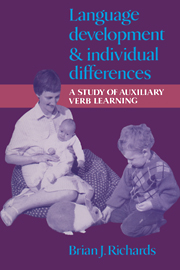Book contents
- Frontmatter
- Contents
- List of figures
- List of tables
- Preface
- Symbols used in transcription
- Pronunciation table
- PART I INTRODUCTORY SECTIONS
- PART II INDIVIDUAL DIFFERENCES AND AUXILIARY VERB LEARNING IN SEVEN CHILDREN
- PART III ENVIRONMENTAL INFLUENCES AND INDIVIDUAL DIFFERENCES IN AUXILIARY VERB LEARNING
- 10 Previous research
- 11 Yes/No questions and rate of auxiliary learning for thirty-two children
- 12 Conclusion
- Notes
- References
- Index
12 - Conclusion
from PART III - ENVIRONMENTAL INFLUENCES AND INDIVIDUAL DIFFERENCES IN AUXILIARY VERB LEARNING
Published online by Cambridge University Press: 19 September 2009
- Frontmatter
- Contents
- List of figures
- List of tables
- Preface
- Symbols used in transcription
- Pronunciation table
- PART I INTRODUCTORY SECTIONS
- PART II INDIVIDUAL DIFFERENCES AND AUXILIARY VERB LEARNING IN SEVEN CHILDREN
- PART III ENVIRONMENTAL INFLUENCES AND INDIVIDUAL DIFFERENCES IN AUXILIARY VERB LEARNING
- 10 Previous research
- 11 Yes/No questions and rate of auxiliary learning for thirty-two children
- 12 Conclusion
- Notes
- References
- Index
Summary
Summary of main findings
The research reported in this volume set out to study individual differences in rate and style of auxiliary verb learning. In the three main sections these have been related to age and stage of emergence, variation in analytic and holistic tendencies, and the facilitative role of child-directed speech.
Part I
Chapter 2 investigated the extent to which rate of auxiliary verb learning as measured by Wells (1979a) was attributable to syntactic rule-learning ability. It was found that measuring the time from emergence to a criterion of proficiency confounded age and stage of emergence with rate of development. Nevertheless, the analysis drew attention to broad variation in the stage of syntactic development at which the first auxiliaries are recorded. This variation was interpreted as being due to differences in children's use of rote-learning strategies at a low MLU. An additional factor, possibly related to syntactic rule-learning ability and age/stage of emergence, was an indication that a minority of children are rapid piecemeal learners. This phenomenon is of methodological interest to any research which uses the auxiliary as an index of development. Children who satisfy functional requirements in this way may give a misleading impression of syntactic maturity.
Redefining ‘auxiliary’ to comprise a more homogeneous set of forms reduced differences in the stage (as measured by MLUS) at which a new criterion was reached. It was concluded that there is a reciprocal relationship between general syntactic development and the auxiliary; variation in rate of auxiliary learning cannot be considered in isolation from other aspects of the development of syntax.
- Type
- Chapter
- Information
- Language Development and Individual DifferencesA Study of Auxiliary Verb Learning, pp. 213 - 233Publisher: Cambridge University PressPrint publication year: 1990



